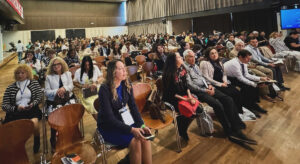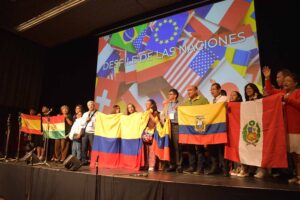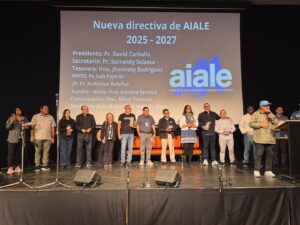 From September 11 to 14, 2025, more than 350 participants from across Europe (EUD & TED) gathered at the Vormingscentrum Center in Malle (Antwerp, Belgium) for the AIALE Congress (Association of Latin American Adventist Churches in Europe).
From September 11 to 14, 2025, more than 350 participants from across Europe (EUD & TED) gathered at the Vormingscentrum Center in Malle (Antwerp, Belgium) for the AIALE Congress (Association of Latin American Adventist Churches in Europe).
Under the theme “Mission Possible,” the congress offered moments of worship, reflection, training, and fellowship—emphasizing that the Hispanic work is not an addition, but an integral and strategic part of the Church in Europe. The event featured 10 guest speakers from the United States and the musical group EMAD from Mexico, who led the worship throughout the weekend.
The work of Hispanic churches in Belgium and across Europe
Spanish-speaking congregations have taken on an increasingly visible and active role in the mission of the Church.
 One of the highlights of the event was the Parade of Nations, which celebrated the presence of Hispanic churches from Milan, Zurich, London, Amsterdam, Barcelona, and Brussels, among others.
One of the highlights of the event was the Parade of Nations, which celebrated the presence of Hispanic churches from Milan, Zurich, London, Amsterdam, Barcelona, and Brussels, among others.
In Belgium, the growth of the Hispanic work is evident, largely thanks to the vision and support of the Belgian-Luxembourg Federation, which has consistently encouraged all foreign-language congregations within its territory.
Because of this support, the Hispanic churches in Belgium are vibrant and dynamic, carrying out a wide range of activities and projects in which both young people and adults use their gifts in service and mission.
Particularly noteworthy is the active involvement of second-generation youth—many born in Belgium to immigrant parents—who are playing a key role in their churches.
They are leading in areas such as technology, audiovisual production, and digital media, serving faithfully and creatively. This shows that the new Hispanic generation is integrated into the European context while remaining deeply rooted in their faith and identity.
Impact and vision for the future
 For the organizers, this congress was not merely a gathering of Latin American Adventists—it was a reaffirmation that the Hispanic mission in Europe is alive, growing, and called to serve.
For the organizers, this congress was not merely a gathering of Latin American Adventists—it was a reaffirmation that the Hispanic mission in Europe is alive, growing, and called to serve.
The vision is that these churches will not remain isolated entities, but continue to serve as platforms for cultural integration, discipleship, community engagement, and support for immigrants and new generations of European Hispanics—working hand in hand with the countries where they are established.
Special thanks
 As part of the organizing committee, we are deeply grateful to God for His blessing and guidance throughout this event.
As part of the organizing committee, we are deeply grateful to God for His blessing and guidance throughout this event.
We also wish to express our heartfelt appreciation to the Belgium-Luxembourg Federation, the Inter-European Division, and the General Conference for their generous financial and logistical support.
Your commitment to the Hispanic ministry in Europe is a clear reminder that we are part of a global and diverse Church, united in vision, mission, and cooperation.
David Carballo




